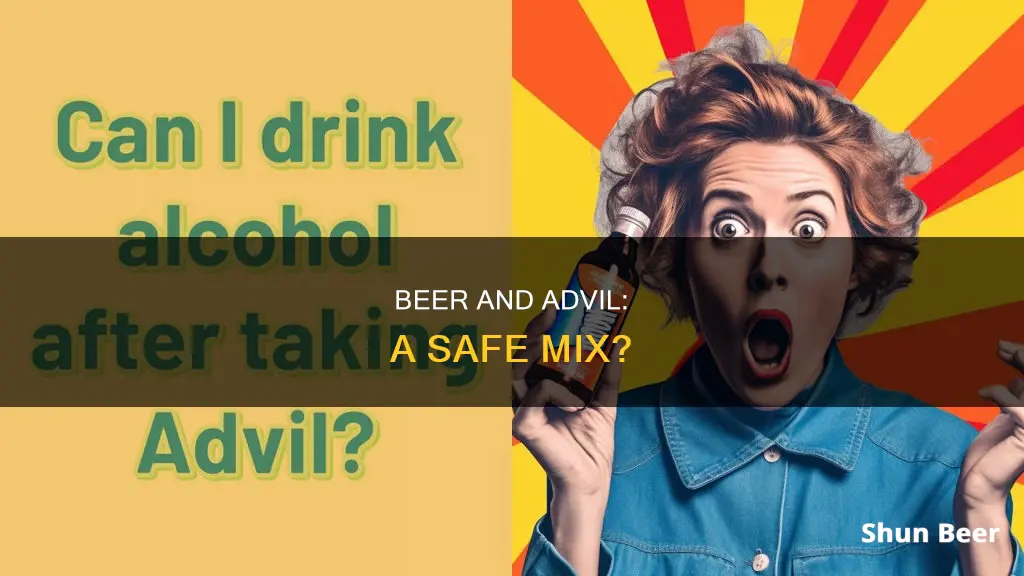
Drinking alcohol and taking Advil (ibuprofen) is generally not recommended, as it can lead to adverse health effects. Both substances irritate the stomach and digestive tract, increasing the risk of ulcers and gastrointestinal bleeding. Additionally, ibuprofen can affect kidney function, and when combined with alcohol, further strain is placed on the kidneys, increasing the risk of chronic kidney disease. Other risks of combining alcohol and ibuprofen include liver damage, drowsiness, and an increased risk of internal bleeding. While a single drink with ibuprofen is typically considered safe, moderate to heavy alcohol consumption can increase the side effects of ibuprofen. Therefore, it is generally recommended to wait at least 10 hours after taking ibuprofen before consuming alcohol, especially for individuals with a history of gastrointestinal issues or other pre-existing conditions.
What You'll Learn

Gastrointestinal bleeding
A study of 1,224 participants showed that regular ibuprofen use raised the risk of gastrointestinal bleeding in people who consumed alcohol. People who drank alcohol but only used ibuprofen occasionally did not have this increased risk.
The risk of gastrointestinal bleeding is higher for older adults, with men being more likely to experience gastrointestinal bleeding than women. People with certain health conditions, such as kidney disease, may also be at a higher risk.
Symptoms of gastrointestinal bleeding include:
- Red, black, or tarry stools
- Sudden nausea or loss of appetite
- Vomiting bright red blood or vomit that resembles coffee grounds
If you experience any symptoms of gastrointestinal bleeding, seek medical help immediately.
To reduce the risk of gastrointestinal bleeding, it is recommended to wait at least 10 hours after taking a dose of ibuprofen before consuming alcohol. However, if you are taking ibuprofen regularly for a chronic health condition, do not stop taking the medication just to drink.
Beer and Doxycycline: Is It Safe to Drink?
You may want to see also

Kidney damage
Ibuprofen, the active ingredient in Advil, is a nonsteroidal anti-inflammatory drug (NSAID) that can cause kidney damage. NSAIDs are among the most commonly prescribed drugs worldwide and are available over the counter. They work by inhibiting the cyclooxygenase (COX) enzyme, which reduces prostaglandin (PG) production and weakens the PG-mediated inflammatory response.
Ibuprofen can reduce blood flow to the kidneys, which may lead to kidney damage. While mild kidney injury may not present any noticeable symptoms, more severe damage could result in decreased urine production or swelling in the arms, legs, or feet. Once ibuprofen is stopped, the kidneys usually recover in most people.
The risk of kidney damage from ibuprofen is higher in certain individuals, such as those with existing kidney or liver problems, or those taking other medications that can affect the kidneys or liver. Additionally, higher doses of ibuprofen, such as 2400 to 3200 mg daily, increase the risk of liver and kidney injury.
Combining ibuprofen with alcohol can further increase the risk of kidney problems. Alcohol can cause dehydration and make it harder for the kidneys to filter toxins. Therefore, it is generally recommended to avoid consuming alcohol while taking ibuprofen, especially for individuals with existing kidney problems.
To reduce the risk of kidney damage, it is important to take the lowest effective dose of ibuprofen for the shortest duration necessary to manage symptoms. Consulting with a healthcare provider before taking ibuprofen, especially for those with medical conditions or who are taking other medications, can help ensure safe usage and lower the risk of kidney damage.
Beer Drinking on Atlantic Beach, NC: What's Allowed?
You may want to see also

Lack of alertness
Ibuprofen and alcohol are a risky combination. Both substances have their own set of side effects, and there is no guarantee of how they will react together. Even a small amount of alcohol after taking ibuprofen is risky, and the more you drink, the higher the risks.
Ibuprofen and alcohol can both cause drowsiness and affect your alertness and responsiveness. When combined, this effect is intensified, and you may experience increased relaxation, confusion, lack of coordination, slowed reaction times, slurred speech, or slow movement. This can lead to an increased risk of accidents, unintentional harm to yourself or others, and an inability to function normally.
The combination of ibuprofen and alcohol can also lead to serious health problems, including gastrointestinal bleeding, kidney damage, liver damage, and cardiovascular problems. These risks are especially high for older adults, people with underlying health conditions, and those who take ibuprofen regularly or drink heavily.
To minimize risks, it is recommended to wait at least 10 hours after taking ibuprofen before consuming alcohol. If you have been drinking, it is advised to wait at least 24 hours before taking ibuprofen, as alcohol can stay in your system for about 25 hours. It is also important to follow the recommended dosage and duration of ibuprofen use.
Drinking Beer and Taking Bactrim: What You Need to Know
You may want to see also

Less effective medication
Mixing alcohol with ibuprofen can make the medication less effective while simultaneously worsening its side effects. Ibuprofen is a nonsteroidal anti-inflammatory drug (NSAID) that relieves pain by blocking prostaglandins, which are substances that can lead to inflammation and swelling, resulting in pain. When taken alone, ibuprofen can cause nausea, vomiting, dyspepsia, stomach pain, and diarrhea.
Alcohol can irritate the intestinal tract and stomach, and consuming it with any NSAID, such as ibuprofen, can exacerbate these issues. Even a small amount of alcohol after taking ibuprofen is risky, and the risks increase with the amount of alcohol consumed. Consuming a small amount of alcohol while taking ibuprofen is generally considered safe, but it is still inadvisable.
Ibuprofen can irritate the digestive tract, and when taken for an extended period or in high doses, it can increase the risk of gastric ulcers or bleeding in the digestive tract. Alcohol also irritates the stomach and digestive tract, so mixing the two further increases the risk of ulcers and bleeding. The National Institutes of Health (NIH) state that ibuprofen can interact with alcohol, worsening the usual side effects of ibuprofen, such as bleeding, ulcers, and a rapid heartbeat.
Ibuprofen and other NSAIDs affect kidney function by stopping the production of an enzyme in the kidneys called cyclooxygenase (COX). This lowers inflammation and pain but also changes how well the kidneys can function as filters, albeit temporarily. Alcohol puts additional strain on the kidneys, and regular heavy drinking doubles the risk of developing chronic kidney disease. Thus, mixing ibuprofen and alcohol can greatly increase the risk and severity of kidney damage.
In summary, while consuming a small amount of alcohol while taking ibuprofen is generally considered safe, it is still not advisable, as it can make the medication less effective and worsen its side effects. The risks are further elevated for those with existing health issues, such as kidney or liver disease, high blood pressure, or heart failure.
Kegerator and Stella: A Perfect Match?
You may want to see also

Cardiovascular problems
Ibuprofen, the active ingredient in Advil, is a nonsteroidal anti-inflammatory drug (NSAID). NSAIDs are a group of medications that are commonly taken to treat pain and inflammation. They are widely available over the counter, but they are still strong medications that come with the risk of harmful side effects, especially if not taken correctly.
Ibuprofen can cause marked worsening of existing hypertension (high blood pressure) or the development of new high blood pressure. It can also cause kidney damage, especially in those with chronic kidney disease, and even worsen heart failure. In addition, ibuprofen can lead to heart attacks and strokes. NSAIDs harm the heart by changing levels of substances in the blood that make clots more likely. A blood clot can block a narrowed artery in the heart, triggering a heart attack. They also change blood flow in the kidneys, causing the body to retain more salt and water, which causes blood pressure to rise, boosting the risk of a stroke. High blood pressure also makes people more prone to atrial fibrillation, a rapid, quivering motion of the heart's upper chambers.
The risk of cardiovascular problems is higher for people who take ibuprofen regularly and heavily. People with underlying medical conditions, such as liver or kidney disease, high blood pressure, or heart failure, are most at risk. It is recommended to wait at least 10 hours after taking a dose of ibuprofen to drink alcohol. However, if you are taking ibuprofen regularly for a chronic health condition, do not stop your medication just to drink.
Beer and Kidney Disease: What's the Connection?
You may want to see also
Frequently asked questions
It is generally advised to wait at least 4 to 6 hours after consuming alcohol before taking Advil. If you have a history of gastrointestinal issues, it is recommended to wait even longer or avoid combining the two altogether.
Combining alcohol and Advil can increase the risk of kidney damage, liver problems, and gastrointestinal bleeding, especially in individuals with pre-existing conditions or those who consume alcohol excessively.
It is recommended to wait at least 10 hours after drinking alcohol before taking Advil, as it takes around that long for the average person's body to clear the alcohol.
No, there are no pain medications that are not affected by alcohol. All painkillers carry their own risks when combined with alcohol.







